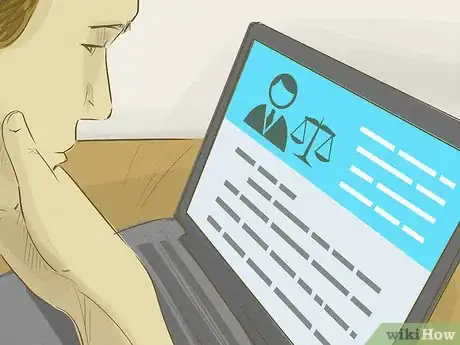This article was co-authored by Clinton M. Sandvick, JD, PhD. Clinton M. Sandvick worked as a civil litigator in California for over 7 years. He received his JD from the University of Wisconsin-Madison in 1998 and his PhD in American History from the University of Oregon in 2013.
There are 7 references cited in this article, which can be found at the bottom of the page.
This article has been viewed 49,965 times.
Retaliation by a landlord against a tenant is illegal in most areas. Retaliation refers to certain acts the landlord may take after a tenant has exerted his or legal rights. These acts could include an increase of rent or notification of eviction. If you believe that your landlord has retaliated against you, you have several options to pursue. It is usually possible to stop the retaliation and, depending on the circumstances, perhaps recover additional compensation as a penalty.
Steps
Taking Basic Steps to Stop Retaliation
-
1Collect and keep any evidence of the landlord’s retaliation. As soon as the landlord begins any retaliatory action, you need to collect evidence of it. You may be able to resolve your dispute with the landlord without going to court, but in case the matter does go to court, you will need evidence.[1]
- Keep copies of any letters or notices that the landlord sends you that you believe show the retaliatory action.
- Take photos of any negative living conditions that are the source of the problem.
- Get written statements from other tenants, if possible, that describe what the landlord has done wrong.
-
2Start a “paper trail” to put the landlord on notice that his actions are not allowed. If you are lucky, you may be able to point out the error and get your landlord to stop. But in case your landlord doesn't, you will want proof of your communications in writing. Send your landlord a letter that contains the following points:[2]
- Detail the relevant act that your landlord committed and notify him or her that you believe it was retaliatory.
- List any relevant laws or statutes that prohibit such behavior.
- Notify the landlord that you expect the act to be reversed. For example, if the landlord issued an eviction notice, ask to have it rescinded in writing.
- Notify the landlord that you will enforce your rights in the legal system if the situation is not corrected.
Advertisement -
3Contact a consumer-protection or tenants’ rights agency to get help. In many areas, particularly larger cities, there are fair housing agencies or legal aid offices that will help tenants protect their rights against unethical landlords.[3] [4] Check your telephone book or do an Internet search for such agencies in your area, and contact them to seek advice and help.
-
4Get in touch with relevant local officials. Depending on the severity of the offense, you may need to reach out to the local police, building inspector, or a city attorney’s office to report the landlord’s actions. You may only be able to file a report, or you may be able to have someone come out to your house to investigate the problem. Getting these officials involved may be enough to convince your landlord to stop whatever action he is taking.
- If any of these officials respond or create any written reports, keep copies of everything.
- Keep a written record of the time and date you made each contact. You may need this information for a lawsuit down the road.
Taking Action in Court to Stop Retaliation
-
1Consider meeting with an attorney. Many landlord and tenant problems can be resolved without an attorney, but if your problem looks like it's getting bad enough to go to court, you may want to seek out the advice of an attorney. To find a qualified lawyer, contact your state bar association's lawyer referral service. After answering a few questions, you will be put in contact with a number of qualified attorneys in your area.
- Be sure you ask about fees before you hire an attorney. Once you hire the attorney, make sure the fee agreement is memorialized in writing.
-
2Seek out low-cost help. If you cannot afford a full service attorney or law office, consider law school clinics and legal aid offices. Law schools throughout the country offer their students practical learning experiences by allowing them to represent low income individuals in housing disputes. Contact law schools in your area and ask about student housing clinics. If your local law school does not offer a housing clinic, find legal aid organizations that take on housing disputes. If you qualify, legal aid will offer you free legal representation so you can respond to retaliatory landlords appropriately.
-
3Request a Temporary Restraining Order (TRO) if you need immediate action. If, for example, the landlord’s level of retaliation is extreme so that he changed the locks on your apartment or something like that, then you need immediate action. Legally, this immediate help is called a Temporary Restraining Order.
- Go to the housing court (if your area has one) or the trial court. Once there, go to the Clerk's Office and ask about filing a complaint for a TRO.
- When you talk with the court clerk, ask for the form to file for a TRO. You will have to write out the facts of what happened and provide any evidence that you have right away.
- A judge will often hear your side of the matter immediately and issue a temporary order to allow you into the apartment.
- You will be required to deliver a copy of that order to the landlord and perhaps contact the police to accompany you to enforce it.
- The court will schedule a second hearing, usually within a few days. You will be required to provide your landlord with notice of this hearing date. At that second hearing, the court will hear from both you and the landlord. You will need to have any evidence or witnesses available at that second hearing.
-
4File a case in your local housing court or small claims court. Some cities have a dedicated Housing Court just for resolving landlord and tenant issues. In other areas, you will need to file a complaint in the lowest level trial court. Look up the court system in your local telephone book or online, call the court clerk, and explain that you are a tenant with a housing issue. The clerk will usually be able to tell you exactly where you need to file. In many cases, there will be a simple fill-in form that serves as a complaint.[
- Be sure to ask about a filing fee and be prepared to pay it.
-
5Prepare for your hearing or trial. You may choose to do this on your own or hire an attorney to help. Many landlord and tenant issues can be resolved without an attorney, but you are allowed to have legal representation if you wish. If the issue is complicated and involves a large amount of evidence and witnesses, it may be a good idea to get an attorney.[5]
- Collect your evidence and organize it in a way that you can present it logically to the judge or hearing officer who will hear your case.
- Make use of discovery information. Depending on the court where you file your complaint, you may have the opportunity to submit “discovery” requests. This is a procedure for you to get information from the landlord before the trial, in order to understand how he plans to present his case.
-
6Attend the hearing or trial and present your case. For many landlord and tenant disputes, don’t expect this to be a full-blown trial like you see in the movies. More likely, you and the landlord will meet less formally in a conference room with a hearing officer (who may or may not be a judge) and present the two sides of your dispute. The hearing officer will listen and then issue a decision.
Defining and Recognizing Retaliation
-
1Know your basic rights as a tenant. While each state has its own laws, there is a list of basic rights that apply to all renters that cover the search for a place to live as well as your rights while living there. These rights include:[6]
- The right against discrimination. A landlord may not discriminate on the basis of race, religion, national origin, sex, age, family status (including not allowing children or pregnancy), physical or mental disability.
- The right to use a service animal, if you need one. A landlord cannot refuse to rent to you based on a “no pets” rule if you have a trained service animal.
- The right to certain information disclosure. If a landlord refuses to rent to you for some reason other than information on your official credit report, he must tell you his reasons. Some examples might include information from prior landlords or other tenants. (Note that the law does not say that the landlord has to rent to you; but he at least has to explain to you the reason, and it may not be one of the protected discriminatory issues listed above.)
- The right to a “habitable” home. This means that the house or apartment you are renting must meet certain basic living conditions. There must be running water. There cannot be holes in the floors. The heat must work. It cannot be infested with rodents, insects or other pests. Every house or apartment doesn’t have to be a mansion, but it does have to meet basic standards.
- The right to privacy. Your landlord may not enter your apartment without your permission, unless there is a real emergency. If he needs to make repairs or provide some other service, he is expected to give you reasonable advance notice.
-
2Understand your local anti-retaliation laws. Every state has its own laws prohibiting retaliation. Some have broader definitions than others, but in general, most states apply the same basic expectations. The following distinctions are fairly universal:[7] [8]
- terminating a tenancy -- If a landlord notifies you that he doesn't want to renew your lease at the end of the month, this could be seen as retaliation. If you have recently taken some act to exercise your rights as a tenant, then his act is illegal. But if his mother-in-law needs to move in, it could just be a change in his circumstances, which would be allowable.
- filing an eviction lawsuit - If your landlord suddenly files a notice of eviction or a complaint against you to have you evicted, soon after some action that you have taken to exercise your rights as a tenant, then this is likely to be considered as retaliation. On the other hand, not all evictions are retaliatory. If you have created some reason to be evicted (unacceptable noise levels, nonpayment of rent, etc.), then the landlord's action may be perfectly acceptable.
- increasing the rent - If you made a complaint about pests in the apartment, and then the next month the landlord raises your rent, this is likely to be viewed as unlawful retaliation. But if you have been in the apartment for two years with no rent increase, it might be just fine.
- Whatever the situation, recognize that it depends on the specific facts of your case. If your landlord's action comes right after some legal action of yours, then it will appear to be more like retaliation and the court will likely rule that way. But if the landlord can explain a valid reason for his action, then the court may rule in his favor.
-
3Learn more about the laws of renting. If your problem gets really bad, you may eventually need to hire an attorney. But before you get to that point, there are many resources available, both online and in print, that you can read to learn more. Check your library or local bookstore for books on renters’ rights. To get started, you can check out these links for more information:
- ”Tenant Rights” from the U.S. Department of Housing and Urban Development, contains links to each of the 50 states, with specific information about tenants’ rights in each state.[9]
- ”Renting a House or Apartment” at Nolo.com, gives useful practical information about things you should expect as a renter.[10]
- ”Tenant Rights” at Findlaw.com, contains links to numerous articles on specific topics about basic rights, security deposits, retaliation, and more.[11]
-
4Recognize retaliation if it happens. Understanding your rights is only the first half of the problem. Retaliation comes when you complain about your rights, and the landlord then takes some action against you.
- For example, if your apartment has a bug problem, you have the right to point it out to your landlord and expect him to bring in an exterminator. If he does that, then the problem is solved. This would turn into illegal retaliation if the landlord then raised your next month’s rent because you cost him money.
- As another example, suppose you complained to a Fair Housing Board because you felt discriminated against in looking at apartments, so the landlord took you in. So far, so good. But if suddenly decides not to include certain utilities in the rent that had been advertised, that would be retaliation.
- Finally, suppose you rent an apartment that has badly peeling paint, because the landlord says he is planning to fix it. After six months, and no sign of a new paint job, you withhold your rent money and pay for the painting yourself. Then your landlord gives you an eviction notice for failure to pay rent. This would require some explanation in court, but the timing of things looks like the landlord’s retaliation is illegal.
Warnings
- An eviction lawsuit will appear on your credit report. To avoid this, take the issue to court as soon as possible and have it resolved before the eviction date, as this will render the eviction suit useless.⧼thumbs_response⧽
References
- ↑ http://d3n8a8pro7vhmx.cloudfront.net/tenantresourcecenter/pages/58/attachments/original/1380042768/retaliation.pdf?1380042768
- ↑ http://d3n8a8pro7vhmx.cloudfront.net/tenantresourcecenter/pages/58/attachments/original/1380042768/retaliation.pdf?1380042768
- ↑ http://www.philadelphiabar.org/page/NewsItem?newsItemID=1001180
- ↑ http://d3n8a8pro7vhmx.cloudfront.net/tenantresourcecenter/pages/58/attachments/original/1380042768/retaliation.pdf?1380042768
- ↑ http://realestate.findlaw.com/landlord-tenant-law/your-rights-as-a-tenant.html
- ↑ http://realestate.findlaw.com/landlord-tenant-law/your-rights-as-a-tenant.html
- ↑ http://portal.hud.gov/hudportal/HUD?src=/topics/rental_assistance/tenantrights
- ↑ https://www.nolo.com/legal-encyclopedia/chart-anti-retaliation-statutes-tenants-29668.html
- ↑ http://portal.hud.gov/hudportal/HUD?src=/topics/rental_assistance/tenantrights







































































